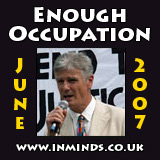
 Innovative Minds © 2014. All Rights Reserved. www.inminds.co.uk | |
Fears spread of UK boycott campaignJonny Paul, Jerusalem Post Following the vote by the British Union of Colleges and Universities (UCU) to consider imposing a boycott on Israeli academics, concern is growing that the largest labor union in Britain, UNISON, might go further and vote to boycott Israeli products. Israel has also noted that the leader of South Africa's trade union federation has now come out in favor of a campaign of boycotts and sanctions against Israel. Alarmed by the prospect of a UNISON boycott move, Histadrut Chairman Ofer Eini on Thursday sent a letter to his UNISON counterpart to try to avert the potentially harmful vote, scheduled for mid-June. "Despite the aggression of the Palestinians, it never occurred to me to impose a boycott on Palestinian workers or employers," Eini wrote. "The boycott against Israel will only cause the situation to deteriorate further." Sources in the UK said it was not clear how serious was the threat of a UNISON boycott, but Eini noted with concern that if it did pass, UK pension funds would stop investing in Israel and UNISON's 1.6 million members could themselves boycott Israeli goods. The UCU vote was only the latest in a series of trades union initiatives designed to sanction Israel - efforts that have hitherto tended to fizzle or be quickly overturned. Earlier this week, meanwhile, Congress of South African Trade Unions (COSATU) president Willie Madisha said COSATU supported a campaign of boycotts, divestment and sanctions against Israel. Madisha was speaking at a news conference in which South Africa's ruling party, the African National Congress, urged South Africans to turn out in their thousands for national protest action next week in solidarity with the Palestinians. The COSATU president said action against Israel "must be sustained for as long as possible beyond the week we have identified. COSATU will campaign among organizations of the working class around the world to support this call." Also Thursday, the Enough! Coalition, of which UNISON is a member, announced that it had scheduled a demonstration in London for June 9 to protest Israel's military presence in the West Bank. Reactions to Wednesday's UCU vote came fast and furious on Thursday, with Israeli officials and academics expressing outrage and British Jews and politicians condemnation. Foreign Minister Tzipi Livni had met earlier in the week with British Ambassador Tom Phillips to register Israel's concern about the spate of boycott motions which, she said, could prove damaging to both countries. Education Minister Yuli Tamir said Thursday that she "regrets that there are people who choose to attack Israel rather than identify with it... I intend to call on the British education minister and the presidents of [British] universities in order to lessen the damage caused by the boycott and to assure the integration of Israeli academia in the international academic arena." Zeev Bielski, executive chairman of the Jewish Agency, said that his organization would work with the Jewish community in Britain to overturn the UCU decision. "It is a shame that academics, who are always a bastion of democracy and free speech, should resort to such a discriminatory, stereotyped and warped manner of behavior," Bielski said. The UCU said on Thursday that the motion it passed a day earlier did not "directly call for a boycott." Sally Hunt, general secretary of the newly formed union, an amalgamation of two other unions, clarified that the UCU had, rather, voted to consider one. "The motion on boycott means all branches now have a responsibility to consult all of their members on the issue, and I believe that every member should have the opportunity to have their say," she said. "The earlier motion means that any future calls for a boycott must pass key tests before a boycott can implemented." Uriel Reichman, president of the Interdisciplinary Center (IDC) in Herzliya, said in a speech to IDC graduates during Thursday evening's commencement ceremony that "Academia is based on discourse, argument and the transparent search for truth. A boycott which is identified with opinions whose roots may be religious or a totalitarian world view is therefore inherently incompatible with academia." "The British decision is hypocritical," Reichman said. "It disregards the terror acts against our citizens, the ideology that calls for the destruction of Israel and our relative restraint in exercising our own self defense. It speaks solely against Israel and ignores truly appalling human rights abuses in Darfur, Chechnya or the civil war in Iraq. The true purpose and result of the boycott is to upset basic principles of justice and to deprive Israel of its right to argue its position." The University of Haifa expressed "shock and dismay," calling the boycott vote "a callous decision that has no place in the world of academia." Other Israeli academic institutions expressed similar protests. In England, several politicians, academics and organizations condemned the UCU vote. "The UK government," said Minister of State for Education Bill Rammell, "fully supports academic freedom and is firmly against any academic boycotts of Israel or Israeli academics. I profoundly believe this does nothing to promote the Middle East peace process." Denis MacShane, Labor MP and chair of the Parliamentary Inquiry into Anti-Semitism, said: "The decision by the UCU is completely deplorable and counterproductive. The motion will do nothing to help Palestinian students, who are keen to study in the relative oasis of Israeli universities, and will exacerbate the position of Jewish students in the UK, who already feel harassed, intimidated and uncomfortable on campus." Fellow Labour MP John Mann, and chair of the Parliamentary Committee against Anti-Semitism, added: "This is a total distraction from what the Union should be doing, which is looking after the working conditions and rights of its members. It is in danger of placing itself in the tiny margins of British society - which is not in anyone's interests, least of all Palestinian trade unionists. What is needed is more dialogue, not less." Conservative MP Iain Duncan Smith called the UCU vote "a pathetic attempt by politically motivated people to destroy the balanced ethos on university campuses and use their privileged position to further their own ends. Every right-minded person should condemn it." Liberal Democrat MP Chris Huhne added, "Curbing basic freedoms such as the freedom of inquiry and research would be wholly counterproductive in putting pressure on Israel to change its policies... This boycott is misconceived and should be dropped." Scholars for Peace in the Middle East (SPME) also called the boycott "immoral and antithetical to academic principles." Edward Beck, president of SPME, said in a statement that "the British have separated themselves - not the Israelis - from the global academic community which firmly condemns academic boycotts for moral, ethical and intellectual reasons, frequently acknowledging that academics are active in trying to solve problems and not create additional ones." The Board of Deputies of British Jews called the boycott motion an attack on academic exchange which undermines the values of equality and freedom that ought to be fundamental to all British academic institutions. "It is clear," added Ronnie Fraser, director of the Academic Friends of Israel, "that the union has ignored the words of Dr. Sari Nusseibeh, president of Al-Quds University, who wrote that an international academic boycott of Israel, on pro-Palestinian grounds, is self-defeating - as it would only succeed in weakening that strategically important bridge through which the state of war between Israelis and Palestinians could be ended, and Palestinian rights could there for be restored." In the United States, the Conference of Presidents of Major American Jewish Organizations, the American Jewish Committee and the Anti-Defamation League all condemned the vote as well. Source: http://www.jpost.com/servlet/Satellite?cid=1180527974042&pagename=JPost%2FJPArticle%2FShowFull Also Of InterestPage URL: http://inminds.com/article.php?id=10138
|
|
Support Us
If you agree with our work then please support us.Campaigns INMINDS Facebook Live Feed Latest Video's
INMINDS Twitter Feed Tweets by @InmindsComFeatured Video's
You need Flash player 8+ and JavaScript enabled to view this video.
[all videos (over 200)..] Featured MP3 Podcast  "The truth is this is not really an occupation of the West Bank at all, its colonisation - aggressive on going colonisation! There are now nearly half a million permanent settlers in the West Bank. Pristine hill top settlements are omnipresent and canonise the West Bank. Whatâs more they breed yet more electric fences, moats, Jew-only roads, road-blocks, checkpoints, soldiers - over 500 of them. Imagine if this situation was reversed, if it was the Palestinians doing this to the Jews would the reaction of this government and the world be the same? I don't think so." House of Lords Enough Occupation Rally, June 2007 [6min / 3Mb] [all podcasts..] Newsletter Feedback |
 |
 |













































